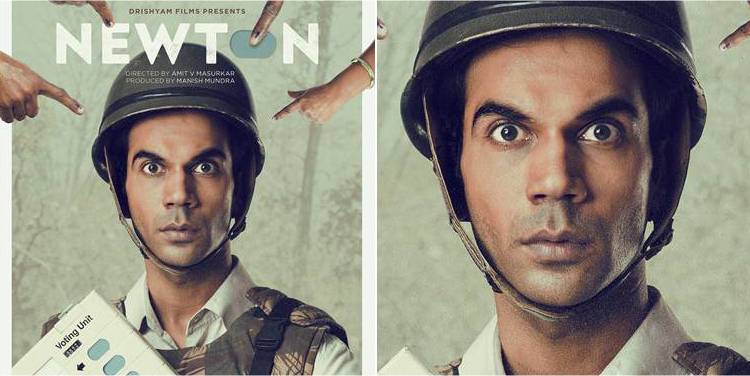The angst resulting from failing public institutions in India has pushed some recent filmmakers to create artistically engaging but nihilistic cinema (for example, Gangs of Wasseypur series). However, there has also been an effort to find a silver lining in the otherwise dark and dour socio-political scenario in the country. Last year’s Newton is an uplifting comedy drama that went on to win the Filmfare Critics Award for Best Film. Rajkummar Rao as Newton Kumar, won Asia Pacific Screen Award for Best Performance by an Actor. Directed by Amit V. Masurkar, the film tells the story of a determined election officer who battles against government apathy, insurgents’ threat, colleagues’ indifference and voters’ ignorance to conduct free and fair polls in a remote tribal village in central India.
It is a tribute to the resolve of ordinary men and women who wish to serve the nation by sticking to one simple rule—do your duty. The film thus seeks to inspire young Indians to rise above their demoralising context and be good for goodness’ sake. Wouldn’t we all want such young men and women to steer our nation forward? The film merits patient watching and looking for clues to a better India behind its emotional appeal.
At one point, Loknath ji (played by inimitable Raghubir Yadav) asks Newton Kumar about the source of his courage. “You must know a politician or some other big shot. Otherwise, how could you take on the police officials?” Of course, the source of courage that Newton Kumar, the presiding officer of a Dandakaranya election booth, had was his sense of duty. He wished to work honestly. He wished to work honestly in an environment that is clogged up with lies, indifference and make-believe.
But that is not all. Our personal sense of right and wrong is not the only thing that determines that we will choose the right thing. Our determination is not everything. We choose the right thing also because we are inspired by some heroes. Who was Newton Kumar’s Hero? Newton Kumar, a government officer from Dalit background, we know, is committed to the Indian Constitution, which in popular imagination is the brainchild of Dr B R Ambedkar.
Our personal sense of right and wrong is not the only thing that determines that we will choose the right thing.
For a fleeting second, one could see that in Newton’s room is hung a portrait of Dr Ambedkar.
But that again was not all.
We are inspired by ideas we believe to be true. Sometimes these philosophic ideas are bigger than heroes. The big idea that gave edge to Newton’s resolve to be honest was an insight into the work of Isaac Newton, the apple-wala scientist! Nature is no respecter of people. Natural Laws are the same for all (“You can throw a business tycoon and a tea seller from a cliff and both will meet the same fate!” says a senior officer). By implication, all are equal. The vote of every single individual is equal. That is why Newton Kumar is ready to put his life on the line to make every single voter cast his or her vote.
The little problem is that nature does not always teach us equality. Nature, to many people, teaches “survival of the fittest”. Besides, our social experience teaches us that it is much easier to throw a tea seller—and get away with it—than a tycoon from the top of a cliff!
Isaac Newton, we know, was able to bring cataclysmic change in the field of physics because he refused to go with the fundamental, Aristotelian, assumptions governing Western science. He decided to check it for himself the so-called scientific conclusions of his time. It may sound strange to many people but Isaac Newton, the seventeenth-century English scientist, was also a man of religion. Since in his eyes God was the common father of all creation and the whole creation could be thought of a family, he implies that God, and not nature, is the final arbiter of the question of human equality and dignity.
Human beings have dignity and they deserve to be treated equally because all of them are made in the image of their creator and have common ancestry. Everyone’s vote counts because, every citizen has the God-given right and illumination to choose according to his or her conscience. Conceived in this way, democracy is sacred and needs to be protected.
An intriguing part of the film, of course, is its very title. The name of the protagonist is not the one given by his family. He was called Nutan, a feminine word that means “new”, which was embarrassing for the male name-bearer. Though the name itself is rather beautiful, in the given context, the ingenious adoption of the new name—Newton—is effectively life changing. The ability to give oneself a new name and hence a new identity has a symbolic effect. One is master of one’s own fate. Our so-called natural identities are not necessarily final destinies. After all Newton is all about challenging what is conventional.






